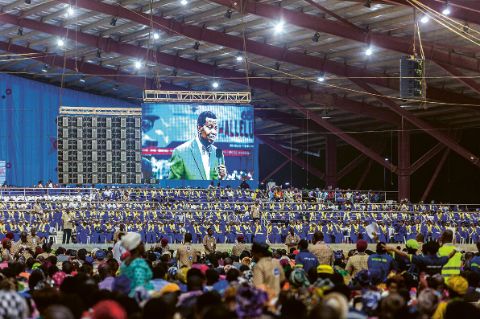Andrew Esiebo

Andrew Esiebo, from the series Eat, Pray, Live: Lagos’s Spiritual Megalopolis (2006–17). Courtesy of the artist
Attempts at describing Nigeria’s bustling megapolis, Lagos, are futile. Many have tried, and though they have come up with amusing descriptions they have largely failed. Lagos is one of those cities where the real thing always trumps any attempt to represent it. Teju Cole: ‘And yet, and yet. This place exerts an elemental pull on me. There is no end of fascinations. People talk all the time, calling on a sense of reality that is not identical to mine. They have wonderful solutions to some nasty problems; in this I see a nobility of spirit that is rare in the world.’ Andrew Esiebo has been a documentarian of both the ‘fascinations’ and the ‘nasty problems’ of the city of his birth for most of his career. His approach has been mainly documentary, zooming into rapid urbanization processes, cultural heritage, gender and sexuality, as well as religion and spirituality. In Global Fascisms, Esiebo’s photographic work turns to the rise of megachurches—those infrastructures of Evangelical Christianity which continue to proliferate in most Lagos neighbourhoods with reckless abandon. His images are documents of a popular, if parallel, reality of life in Nigeria’s largest city. Transnational agents of Evangelical Christianity often rely on megachurches, such as the ones Esiebo captures with his camera, to stoke an anti-LGBTQIA+ agenda in the name of conservative—often extreme right—Christian values.
WORKS IN THE EXHIBITION: Expression of Faith: Pentecostalism’s Energy and Resilience Across Borders (2006–17), series of photographs, dimensions variable; Eat, Pray, Live: Lagos’s Spiritual Megalopolis (2006–17), series of photographs, dimensions variable. Courtesy of the artist